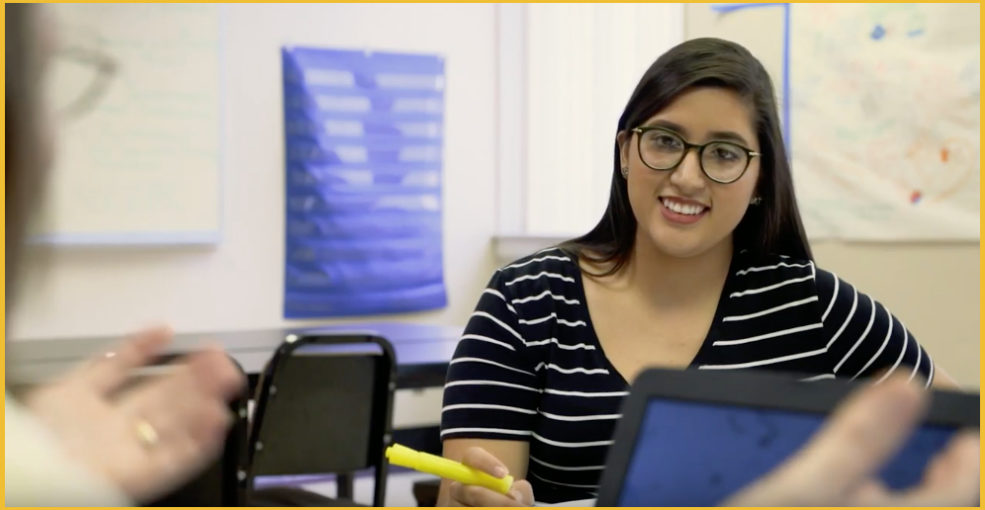Become the kind of teacher who makes a lasting impact on your students. Our training includes both a biblical foundation and preparation for Texas certification.
Criswell offers small classes which provide you with the type of personalized learning experience that will prepare you to walk into your own classroom one day as a confident, competent professional. Because of our location in Dallas, you will have plenty of opportunities to grow your skills in the classroom and your heart for service in the community.
You may apply for admission into the Educator Preparation Program after you have completed 60 credit hours of course work with a minimum GPA of 2.75 or higher. At this point, you will participate in an admission interview conducted by the Criswell College Education Committee. You will be invited to officially enter into our Educator Preparation Program upon the successful completion of the interview.
Department of Education Educator Preparation Information:
https://title2.ed.gov/Public/Home.aspx
Criswell College does not have posted pass rate information due to the size of the program. To date, 100% of graduates have tested for Texas Teacher Certification, have passed all of their tests, and have become certified teachers in Texas.
PROGRAM COURSE INFORMATION – Early Childhood-6th Grade
COM 101 Rhetoric and Writing I
COM 102 Rhetoric and Writing II
COM 201 Intercultural Communication
CRIS 100 The Roots of a Christian Scholar
CRIS 201 Global Learning and Service
CRIS 202 Global Learning and Service Lab (non-credit)
CRIS 203 Local Learning and Service
HIS 103 American History I
HIS 104 American History II
POL 202 State and Local Government
POL 203 Introduction to American Politics
SCI 205 Physical Science
100-400 Mathematics
BIB 105 Hermeneutics
CRIS 300 Baptist Faith and Witness
EDU 415 Biblical Leadership in an Educational Setting
NTS 101 New Testament Survey I
NTS 201 New Testament Survey II
OTS 101 Old Testament Survey I
OTS 201 Old Testament Survey II
THS 201 Church History
THS 203 Systematic Theology I
THS 204 Systematic Theology II
EDU 200 Introduction to Education
EDU 205 Educational Research and Psychology
EDU 213 Assessment Methods
EDU 301 Principles of Teaching
EDU 303 Child Growth and Development
EDU 308 Early Childhood Education
EDU 312 Discipline and Classroom Management
EDU 313 Special Populations
EDU 315 EC-6 Math Instructional Methods
EDU 317 ESL Instructional Methods
EDU 406 EC-6 Science Instructional Methods
EDU 409 Social Studies Instructional Methods
EDU 410 Clinical Teaching Practicum (6 hours)
EDU 412 Art/Music Integration Methods
EDU 413 Physical Education Methods
EDU 420 Educational Technology
REA 302 Children’s Literature
REA 312 Foundations of Reading Instruction
REA 314 Content Area Reading Instruction
REA 401 EC-6 Language Arts Methods
Previous Early Childhood-6th Program Maps
PROGRAM COURSE INFORMATION – 4th-8th Grade Social Studies
COM 101 Rhetoric and Writing I
COM 102 Rhetoric and Writing II
COM 201 Intercultural Communication
CRIS 100 The Roots of a Christian Scholar
CRIS 201 Global Learning and Service
CRIS 202 Global Learning and Service Lab (non-credit)
CRIS 203 Local Learning and Service
HIS 103 American History I
HIS 104 American History II
POL 202 State and Local Government
POL 203 Introduction to American Politics
SCI 205 Physical Science
100-400 Mathematics
BIB 105 Hermeneutics
CRIS 300 Baptist Faith and Witness
EDU 415 Biblical Leadership in an Educational Setting
NTS 101 New Testament Survey I
NTS 201 New Testament Survey II
OTS 101 Old Testament Survey I
OTS 201 Old Testament Survey II
THS 201 Church History
THS 203 Systematic Theology I
THS 204 Systematic Theology II
ECN 202 Principles of Microeconomics
ECN 203 Principles of Macroeconomics
EDU 200 Introduction to Education
EDU 205 Educational Research and Psychology
EDU 213 Assessment Methods
EDU 301 Principles of Teaching
EDU 303 Child Growth and Development
EDU 312 Discipline and Classroom Management
EDU 313 Special Populations
EDU 317 ESL Instructional Methods
EDU 409 Social Studies Instructional Methods
EDU 410 Clinical Teaching Practicum (6 hours)
EDU 420 Educational Technology
HUM 204 Modern World
HUM 404 Faith and Culture
POL 303 International Relations
REA 302 Children’s Literature
REA 312 Foundations of Reading Instruction
REA 314 Content Area Reading Instruction
Previous 4th-8th Grade Social Studies Program Maps
God brought me here for a reason, and I look forward to seeing how He will use my education to impact the children I’m preparing to teach.
BECOME A TEACHER
There has never been a greater opportunity for teachers trained with a Christian
worldview to impact the lives and families of children.


CAREERS
Students who graduate with a B.S. in Education are ready to:
- Be certified as a teacher in the state of Texas and get a job in a public or private school to shape the hearts and mind of young students.
PROGRAM DIRECTOR
B.S. in Education
Why attend Criswell College? Because of professors like Dr. Brown, who turn dreaded courses into aha moments.



